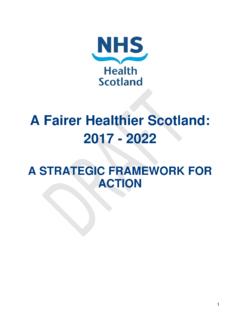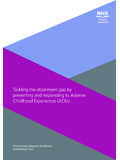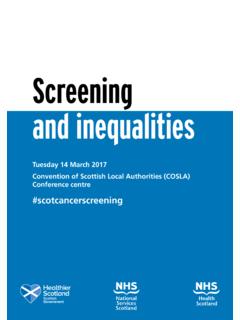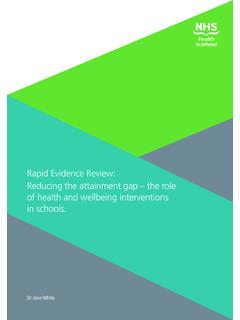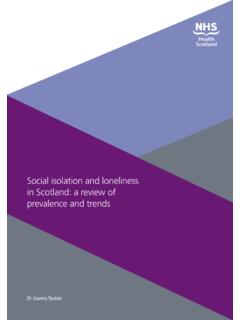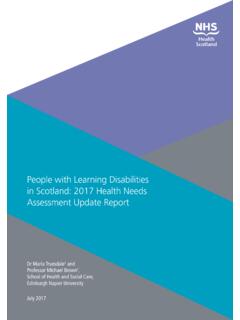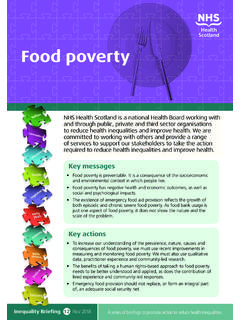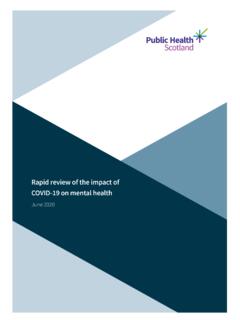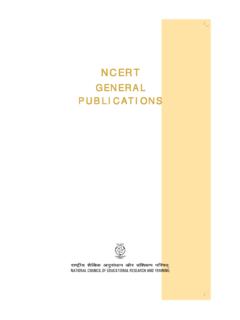Transcription of Reducing Offending, Reducing Inequalities
1 Reducing offending , Reducing inequalitiesAchieving better health, better lives through community justicePublished by NHS Health Scotland1 South Gyle CrescentEdinburgh EH12 9EB NHS Health Scotland 2017 All rights reserved. Material contained in this publication may not be reproduced in whole or part without prior permission of NHS Health Scotland (or other copyright owners).While every effort is made to ensure that the information given here is accurate, no legal responsibility is accepted for any errors, omissions or misleading Health Scotland is a WHO Collaborating Centre for Health Promotion and Public Health resource may also be made available on request in the following formats: 0131 314 5300 Contents Contents.
2 1 Writing group membership and acknowledgements .. 3 Writing group membership .. 3 Contributors .. 3 Acknowledgements .. 4 Chapter 1: Introduction and rationale .. 5 NHS Health Scotland: our approach .. 6 The social pattern of offending .. 8 Reducing offending and Reducing inequality .. 15 Community justice: an opportunity to reduce Inequalities .. 17 Chapter 2: Increasing the opportunities for earlier intervention .. 21 Preventing violence .. 23 Reducing the impact of alcohol and drug 25 Improving mental health .. 31 Reducing trauma .. 36 Chapter 3: Mitigating the impact of offending and sentencing .. 41 Reducing victimisation .. 41 Working with families as assets .. 45 Opportunities in police custody and 48 Increasing alternatives and diversion from prosecution.
3 53 Increasing community-based sentencing .. 58 Optimising custodial care .. 65 Chapter 4: Building resilience and sustaining change .. 79 Maximising individual resilience .. 79 Improving the delivery of custodial services .. 85 Strengthening community justice .. 91 Chapter 5: Proposed opportunities for action .. 97 Opportunities for earlier intervention .. 97 Mitigating the negative impact of offending and sentencing .. 97 Building resilience and sustaining change .. 98 Appendix 1: Scottish examples of evidence-based violence-prevention programmes .. 99 2 Appendix 2: Scottish agencies and initiatives which build resilience in families, children and young people .. 100 Families Outside .. 100 Family Nurse Partnership (FNP).
4 101 Families affected by imprisonment .. 101 Family visitor centres and help hubs .. 102 Scottish Families Affected by Alcohol and Drugs .. 103 Useful policy links .. 103 Children and Young People (Scotland) Act 2014 .. 104 The Early Years Framework .. 104 Early Years Change Fund .. 105 GIRFEC .. 105 The National Parenting Strategy: Making a positive difference to children and young people through parenting .. 106 References .. 107 3 Writing group membership and acknowledgements Writing group membership Phil Eaglesham: Organisational Lead for Community Justice, NHS Health Scotland (lead author/editor). Louise Gallagher: Health Improvement Lead for Community Justice, NHS Greater Glasgow & Clyde (lead author/researcher).
5 Willie Kennedy: Planning Officer, North Strathclyde Community Justice Authority/ Scottish Government (author). Beth Macmaster: Planning and Development Officer, Glasgow Community Justice Authority/Prison Monitoring Coordinator, HMIPS (author/researcher). Janet Tobin: Health Improvement Programme Manager, NHS Greater Glasgow & and Clyde (author). Contributors Dr Philip Conaglen: Consultant in Public Health, NHS Lothian. Katie Cosgrove: Organisational Lead (Gender Based Violence), NHS Health Scotland. Ruth Dryden: Public Health Adviser (Evaluation), NHS Health Scotland. Tina Everington: Health Improvement Lead, Scottish Prison Service/NHS Forth Valley. Katy Hetherington: Organisational Lead (Community Child Health), NHS Health Scotland.
6 Dr Andrew Fraser: Director of Public Health Science, NHS Health Scotland. Dr Lesley Graham: Information Services Division, Scotland. Emma Hogg: Organisational Lead for Improvement, NHS Health Scotland. Sharon Hardie: Health Improvement Lead, NHS Ayrshire and Arran. Tom Jackson: Chief Officer, Glasgow City Community Justice Authority. Prof. Nancy Loucks: CEO, Families Outside. 4 Megan McPherson: Public Health Adviser, Public Health Observatory, NHS Health Scotland. Mhairi McGowan: Women s Aid/ASSIST. Nicola Merrin: Policy Officer, Victim Support Scotland. Justina Murray: Chief Officer, South West Scotland Community Justice Authority. Dr Mark Robinson: Senior Public Health Information Manager, Public Health Observatory Division, NHS Health Scotland.
7 Grant Scott: Senior Charge Nurse & Police Custody Practice Lead, NHS Greater Glasgow & Clyde. Fiona Young: Chief Officer, Lothian and Borders Community Justice Authority. Acknowledgements Ruth Parker: Head of Health & Wellbeing, Scottish Prison Service. Lee Knifton: Mental Health Foundation. 5 Chapter 1: Introduction and rationale NHS Boards in Scotland are all-purpose organisations: they plan, commission and deliver NHS services and have a duty and responsibility for the health of their populations. The vision for health and care in Scotland is that: by 2020 everyone is able to live longer, healthier lives at home, or in a homely setting . Underpinning this are core values committed to by NHSS cotland. These values are collaboration, co-operation and partnership working across NHSS cotland, with staff, patients and with the voluntary sector; continued investment in the public sector rather than the private sector; increased flexibility, provision of local services; and openness and accountability to the public.
8 NHS Boards work closely with their partners including patients, staff, local authorities and the voluntary sector to deliver effective healthcare services and to safeguard and improve the health of their residents and individuals under their care. This care includes individuals with a number of complex needs (see Figure 1), for example: people with histories of trauma and violence; people with substance use and mental health issues (often in tandem); people who are at risk of homelessness or who are homeless; refugees and asylum seekers; and those in contact with justice services. These needs cannot be addressed by health interventions alone. In considering the drivers and consequences of offending , the social patterns and Inequalities behind this challenge provide a common series of drivers and levers which a range of partners both within community justice and beyond in wider universal public services can utilise as a rationale for collective action.
9 This document, while not a systematic review, collates some of the evidence across a range of highly varied determinants related to health and offending to provide a foundation for increased focus on health, justice and inequality. This first section introduces and frames the relationship between offending and Inequalities across key domains as our impetus for more collective local action on health and community justice. 6 Figure 1: Example of complex needs of people in the healthcare system. Reproduced from Scottish Government. National Strategy for Community Justice; 2016. , under the terms of the Open Government Licence NHS Health Scotland: our approach NHS Health Scotland is a national Health Board working with and through public, private and third sector organisations to reduce health Inequalities and improve health.
10 We are committed to working with others and provide a range of services to support our stakeholders take the action required to reduce health Inequalities and improve health. Our vision1 is a Scotland in which all of our people and communities have a fairer share of the opportunities, resources and confidence to live longer, healthier lives. Our mission is to reduce health Inequalities and improve health. To do this we influence policy and practice, informed by evidence, and promote action across public services to deliver greater equality and improved health for all in Scotland. 7 Health inequalities2 are the unfair differences in people s health across social groups and between different population groups. They represent thousands of unnecessary premature deaths every year in Scotland, and for men in the most deprived areas nearly 24 fewer years spent in good health.
